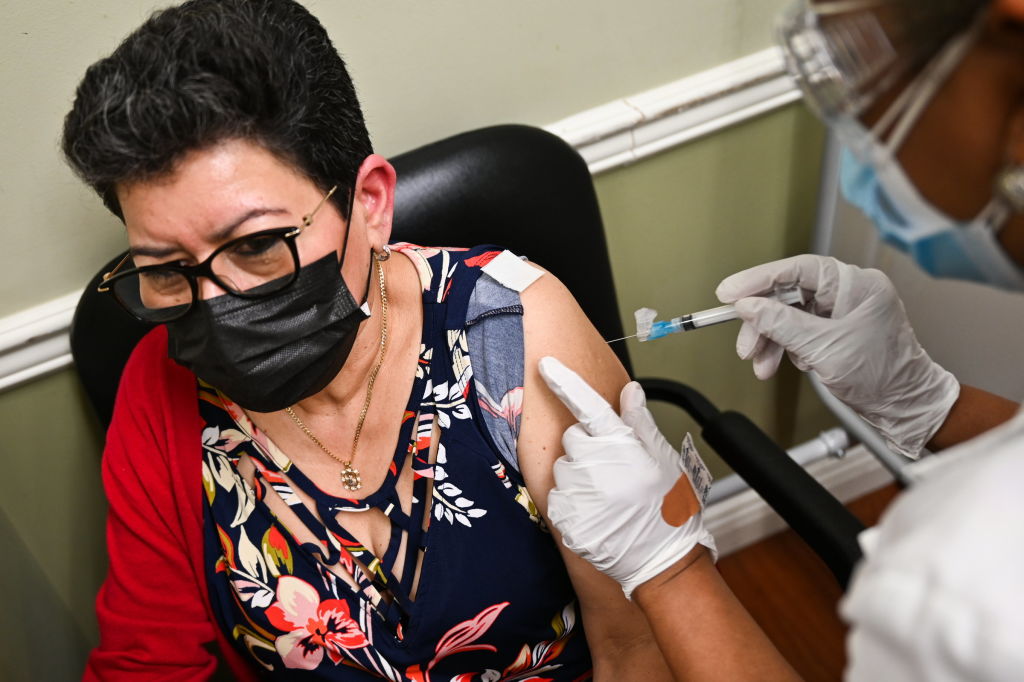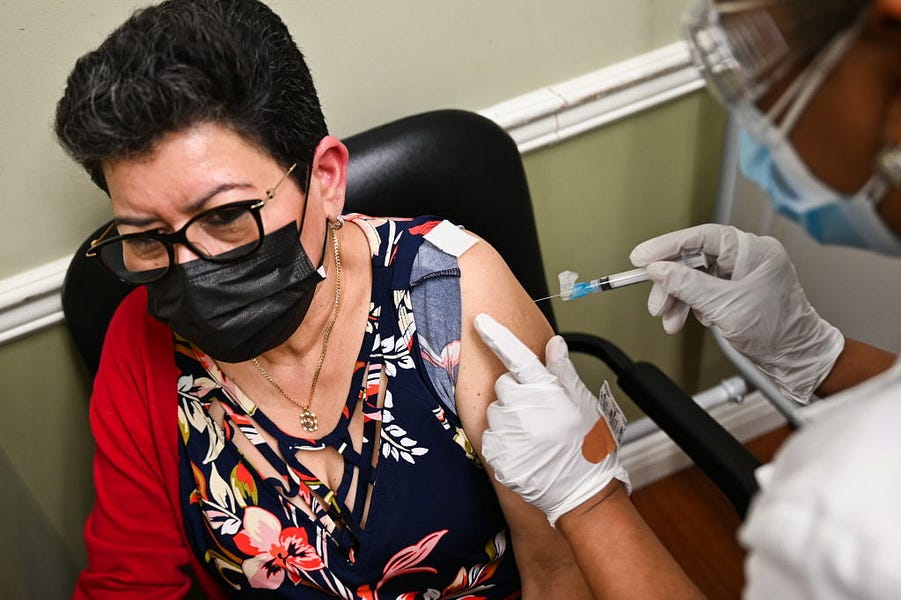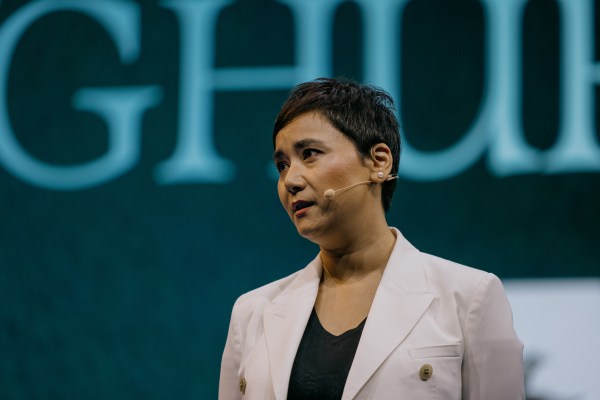Happy Thursday! On this date 401 years ago, the Mayflower set sail from England bound for America. If those 130 brave passengers didn’t make their journey that day, the Chicago Bears likely would never have been in a position to draft Justin Fields this year. Thank you, pilgrims.
Quick Hits: Today’s Top Stories
-
President Joe Biden announced a new trilateral security agreement with Australia and the United Kingdom on Wednesday with the aim of helping Australia develop nuclear submarine capabilities. Although China was not directly mentioned in Biden’s remarks, the partnership—which will also include coordination on cybersecurity, artificial intelligence, and quantum computing—is clearly intended to challenge its hegemony in the Indo-Pacific region.
-
Both North and South Korea fired test ballistic missiles on Wednesday, with South Korea testing a submarine-launched ballistic missile and North Korea firing two ballistic missiles that flew several hundred miles and landed in the ocean. The State Department condemned North Korea’s launch as “in violation of multiple U.N. Security Council resolution.”
-
Pope Francis on Wednesday waded into the debate over administering Communion to Catholic politicians who support abortion, saying that—while he is not up-to-date on the specifics of the situation with President Biden—bishops should minister with “compassion and tenderness” rather than condemnation. He maintained that accepting abortion is “accept[ing] homicide,” but reiterated his belief that the Eucharist “is not a prize for the perfect” but rather “a gift of the presence of Jesus in the church.”
-
A spokesman for Joint Chiefs Chairman Gen. Mark Milley issued a statement on Wednesday that did not dispute the premise of Bob Woodward and Robert Costa’s reporting on his communication with Chinese military officials, but added that Milley “regularly communicates” with his counterparts across the world and that all such calls are “staffed, coordinated and communicated with the Department of Defense and the interagency.” A defense official familiar with the calls told Politico the reports are “grossly mischaracterized,” as Milley reportedly asked acting Defense Secretary Chris Miller for permission to make the call. Miller said yesterday that there was likely “a perfunctory exchange between us and our staffs about coordinating phone calls and messages for the day,” but added that, although he didn’t know if Woodward and Costa’s account is true, it would be “completely inappropriate” on Milley’s part if it is. The White House made clear Wednesday that President Biden has “complete confidence” in Milley’s “leadership, his patriotism, and his fidelity to our Constitution.”
-
U.S. Citizenship and Immigration Services announced this week that, beginning October 1, new immigrants to the United States must be fully vaccinated against COVID-19 to pass the mandatory immigration medical examination. Immigrants had already been required to be vaccinated against mumps, measles, polio, and countless other diseases.
What’s Actually Happening With Biden’s ‘Kind Of, Sort Of’ Vaccine Mandate?

When President Biden announced his administration’s plans last Thursday to tighten the screws on the unvaccinated, Republican elected officials were quick to denounce the moves, promising to fight them in court.
But it’s been a week, and no serious challenges to the employer vaccine/testing mandate have been filed. For good reason: It doesn’t exist yet.
“The Labor Department is working on an emergency rule that will require all employers with 100 or more workers to ensure their workers are fully vaccinated and regularly tested,” Biden reiterated yesterday at a meeting with business leaders and CEOs. “It’s going to take a little bit for them to put those requirements in place under the law.” White House Press Secretary Jen Psaki didn’t put a firm timeline on the Occupational Safety and Health Administration (OSHA) rule, telling reporters Wednesday the administration will “hopefully” have more information “in the coming weeks.”
Several constitutional and regulatory scholars tell The Dispatch it’s almost pointless to speculate how the judiciary will handle inevitable challenges to the rule until we have a full grasp on what it entails. “The devil will be in the details,” said Ilya Shapiro, director of the Robert A. Levy Center for Constitutional Studies at the Cato Institute.
President Biden laid out his directive to OSHA pretty clearly last week: Issue a rule mandating that businesses with 100 or more employees require them either to get vaccinated or to submit to weekly COVID tests, with a penalty of $14,000 per violation. How much leeway does OSHA actually have in crafting the regulation? A lot, it turns out.
“We don’t know whether they’re going to go broad or narrow,” Cato’s Walter Olson told The Dispatch earlier this week. “Each time they go narrower, they potentially make it more effective to resist a group of challengers.”
“Narrower,” in this context, could mean including a religious exemption, and would likely mean exempting workers who don’t congregate in a physical location or who can prove they have a degree of natural immunity from prior COVID-19 infection. Challengers to the rule will likely argue it fails to meet the arbitrary-or-capricious test laid out in the Administrative Procedures Act, particularly if, for example, it ends up applying to remote workers at a large tech firm who haven’t been to the office in months, but not workers in a small meatpacking plant who are in close proximity for hours on end.
“We also don’t know the nature of the testing alternative,” Shapiro said. “Because if it’s really easy and free, [if] the government authorizes and pays for at-home testing for any employee who wants to do it weekly, that’s not very burdensome. And at that point it becomes much more of a testing mandate than a vaccine mandate.”
It doesn’t sound like that will be the case. The White House announced last week it was invoking the Defense Production Act and putting $2 billion toward accelerating the manufacturing of rapid and at-home COVID-19 tests, but Psaki seemed to indicate in her Friday press conference that under the OSHA rule, businesses will shoulder the costs of weekly testing for employees who don’t get the shot.
“It’s certainly more cost-effective to require vaccines,” she said. “[Businesses] may not decide to do that. That’s up to them to decide to do.”
The largest corporations—for whom the cost of compliance, including testing, will be a drop in the bucket—are by-and-large on board with the proposed rule. The CEOs and presidents of Disney, Microsoft, Walgreens, and other companies who have embraced vaccine mandates met with Biden at the White House yesterday.
But for medium-sized businesses—big enough to meet the 100-plus employee threshold, small enough that the rule will be burdensome—many questions remain. What constitutes proof of vaccination or a negative test—and how should employers store that information? Given continued supply chain hiccups, are there even enough tests available on the market? Do businesses—many of which are dealing with an unprecedented labor shortage—actually have to fire employees that won’t comply?
Opposition to COVID-19 vaccination is obviously a minority position in the United States—74 percent of the eligible population has gotten at least one shot, 63 percent is fully vaccinated—and so is opposition to Biden’s plan. About 60 percent of respondents in both Axios-Ipsos and Politico-Morning Consult polls from the past week support requiring companies with at least 100 employees requiring vaccines or testing. (A Quinnipiac survey had it closer to 50-50, but its question was framed in a way that combined multiple different mandates and omitted the existence of a testing alternative.)
Given both their view on the role of the federal government and the nature of who is vaccinated at this point—86 percent of Democrats and 60 percent of Republicans, per a new Pew survey—most GOP officials have carved out a pro-vaccine, anti-mandate position.
“Here’s my thought on the mandate: Good end, bad means,” GOP Sen. John Kennedy of Louisiana told The Dispatch. “I believe in the vaccine, I think the vaccine works. I wish everybody would take it. But I think this move by the president is going to be counter-productive, I really do. I think it’s going to harden the opposition.”
“I don’t think the federal government should be mandating that for private employers,” said Sen. Bill Cassidy, also a Louisiana Republican. “Now, if the private employer wishes to do it, or the local branch of government wishes to do it, then I’m okay with that.”
When the OSHA rule is ultimately released later this month or in early October, expect a legal challenge to emerge within days, if not hours. “We are already communicating with other governors and states to prepare legal options once emergency standards are issued,” Wyoming Gov. Mark Gordon said Wednesday. Shapiro, however, said that any lawsuit will have to come from businesses—not public officials—because the directive “is not applying to states and their subdivisions and [governors] can’t sue on behalf of others.”
The specific circumstances of the plaintiff will matter. “They might look for an employer that reacted to the news about OSHA by saying that it was going to go all the way to a complete vaccine mandate and it was not going to bother with testing,” Olson said, noting he wasn’t sure how the argument would fare. “They might say, ‘All right, this reveals that, at least for some employers, the federal hand is a heavy one. It’s not a testing mandate for any of the employees at this company.”
Shapiro predicted that, once the rule is released and a lawsuit is filed, there will very quickly be a hearing on a temporary restraining order or preliminary injunction. “If there is an injunction, the government will appeal that to the relevant circuit and then up to the Supreme Court,” he said. “So it could go up to the Supreme Court on an emergency motion within two weeks of when it goes into effect.”
Olympic Gymnasts Testify on Sexual Assault Allegations
In a Senate Judiciary Committee hearing Wednesday, four elite U.S. gymnasts took direct aim at organizations they said failed to protect athletes after allegations of sexual assault emerged against former national team doctor Larry Nassar.
In unflinching testimony, Olympians Simone Biles, McKayla Maroney, Maggie Nichols, and Aly Raisman called out USA Gymnastics (USAG), the United States Olympic and Paralympic Committee (USOPC), and the FBI for failing to act quickly to protect hundreds of girls from Nassar’s molestation.
The four were among the first elite gymnasts who in 2015 emerged as victims of Nassar, who committed repeated acts of sexual abuse against them and numerous other young girls under the guise of medical treatment.
Since the abuse scandal broke, victims have come forward from more than two decades of U.S. gymnastics, including the 2010 and 2011 world teams and the 2000, 2012, and 2016 Olympic teams.
“I blame Larry Nassar,” a tearful Biles told the committee, “and I also blame an entire system that enabled and perpetuated his abuse.” She added that “this is the largest case of sexual abuse in the history of American sport.”
Maroney, a member of the U.S. Olympic team in 2012, recounted that when she reported Nassar molesting her “hundreds of times in my bed” to the FBI, “they betrayed me, they betrayed my trust, and they sat idly by, as dozens of girls and women continued to be molested.” She described specific instances of abuse, including one where Nassar drugged her with a sleeping pill and she awoke to find herself “completely alone with him on top of me, molesting me for hours.”
When she explained what happened to an FBI agent, she said that after a long silence, the agent responded: “Is that all?”
“What is the point of reporting abuse if our own FBI agents are going to take it upon themselves to bury that report in a drawer?” Maroney asked.
Nassar is now behind bars serving what is effectively a life sentence. He pleaded guilty in 2017 to federal child pornography charges as well as charges of sexual abuse in Michigan. But years after the abuse first came to light, there is an ongoing reckoning over how USA Gymnastics, the Olympic Committee, and the FBI handled the case. It has since been revealed that U.S. Olympic officials knew about the scandal for a year before the allegations became public in 2016 and essentially ignored them—and that USAG, the governing body for elite competition in the sport, sat on information about Nassar’s abuse for more than a month before reporting it to law enforcement.
A scathing report by Department of Justice Inspector General Michael Horowitz released this July found that the FBI did not open a formal investigation until nine months after it first became aware of the abuse allegations. USAG, as well as hundreds of Nassar’s victims, filed a $425 million settlement proposal in U.S. bankruptcy court in August.
After USAG first reported allegations to the FBI’s field office in Indianapolis in 2015, the IG report said, officials violated FBI procedures by failing to document meetings with USAG officials and key evidence. An agent neglected to write a formal report of an interview with a gymnast about abuse claims until more than a year after it occurred, and officials did not transfer the allegations to FBI agents in Michigan—who would have had more jurisdiction to investigate potential crimes—despite telling USAG that they had done so. Officials later tried to cover-up their handling of the case by giving inaccurate statements and information to internal investigations by the FBI. The inspector general’s report also said that while this was ongoing, the head of the Indianapolis field office, W. Jay Abbott, sought a job with the Olympic Committee. He did not get the job when he applied and retired from the FBI in January 2018.
“It was like serving innocent children up to a pedophile on a silver platter,” Raisman said of the FBI’s inactivity. “Over 100 victims could have been spared the abuse. All we needed was one adult to do the right thing.”
“Although there has been a fully independent investigation of the FBI’s handling of the case, neither USAG nor USOPC have ever been made the subject of the same level of scrutiny,” Biles said. “These are the very entities entrusted with the protection of our sport and our athletes, and yet it feels like questions of responsibility and organizational failures remain unanswered.”
After hearing from the athletes, the Committee held a second panel composed of FBI director Christopher Wray and Horowitz. Lawmakers from both parties expressed fury over the way the case had been handled.
Senate Judiciary Committee Chairman Dick Durbin called the FBI’s handling of the case “a stain on the bureau,” and “a shocking picture of FBI dereliction of duty.”
Ranking Member Chuck Grassley, an Iowa Republican, also slammed the Bureau: “The FBI, including this children’s unit, also placed publicity and its image before victims’ protection in this case.”
Wray, who was not head of the Bureau when the scandal broke, apologized and said the report had made him “heartsick and furious.” He promised that a similar situation would not happen again. He also sought to cast the mishandling as the result of individual rather than institutional failures.
Wray only recently fired Michael Langeman, the FBI agent who the inspector general’s report said failed to open an investigation. Senators also asked Attorney General Merrick Garland and Deputy Attorney General Lisa Monaco to attend the hearing and answer questions, but both declined to come.
“I want to make sure that the public knows that the reprehensible conduct reflected in this report is not representative of the work that I see from our 37,000 folks every day,” Wray said. He promised he would “make damn sure that everybody at the FBI remembers what happened here in heartbreaking detail.”
When asked after the hearing by The Dispatch if he was satisfied with Wray’s answers, Grassley answered an immediate “no.” He said he doesn’t “question [Wray’s] sincerity,” but added that “we need prosecution of these people. If heads don’t roll, if there’s not accountability, this stuff can happen again.”
Worth Your Time
-
Writing in Politico, National Review’s Rich Lowry argues that Larry Elder’s recent embrace of former President Donald Trump’s election lies was a costly mistake—and a warning sign of something that could plague Republicans for years to come. “It’s not as though Elder, a talk-radio show host with no political experience who was running in a deep blue state, was going to cruise to victory regardless,” he writes. “But when he got pushed by Trump supporters into endorsing the stolen-election narrative, he ran directly into a Newsom political buzz saw linking him with Donald Trump and the Jan. 6 riot. In the Georgia special Senate elections earlier this year, Trump himself divided the party and suppressed GOP turnout at the margins by trying to make the election about November 2020 as much as possible and accusing Republicans who didn’t go along with his allegations of partisan treason. There may be other costs to come, perhaps up to and including the 2024 presidential election if Trump is the nominee again.”
-
We don’t know about you, but we spent a significant amount of time yesterday reading Norm Macdonald obituaries and remembrances. This one, from Dan Brooks, is one of our favorites. “Norm Macdonald died less famous than he should have been,” Brooks writes. “He cared about jokes too much, when the business of comedy is not actually about jokes so much as audience shares and sponsors and streams and tickets. The comedy-consuming public claims to care nothing for these matters, of course; we only want funnier and funnier jokes. That is the theory, anyway, but in practice, the public is depressingly susceptible to hype. Fake funny sells. It often sells better than real funny, and it is significantly easier to produce. Norm despised fake funny, both in the industry and in daily life. It troubled him, the way you imagine that song coming out of the ice cream truck would trouble Mozart.”
Presented Without Comment
Also Presented Without Comment
Toeing the Company Line
-
On Wednesday’s Dispatch Podcast, Sarah, Steve, Jonah, and David discuss the latest allegations regarding Gen. Mark Milley, the Biden administration’s vaccine/testing mandate, the California recall election, and more.
-
Jonah’s Wednesday G-File(🔒) is about rules: where they came from, why they’re important, and how partisanship has rendered them meaningless. “My point isn’t about hypocrisy,” he writes. “The hypocrisy is bad, but it’s only smoke generated by a far more dangerous fire. People are putting torches to the rules, but all they know how to do is complain about the other teams’ smoke. … When you embrace the idea that rules are important for constraining your opponents but trivialities to be circumvented or rolled over otherwise—the way Biden wants to rollover governors in the way of his proposed vaccine mandate—you’re telling your opponents to adopt the very same tactic.”
-
Scott Lincicome’s latest Capitolism did not delve into Met Gala fashion as we promised Tuesday, but rather his issues with President Biden’s vaccine mandate. “I wish everyone would get vaccinated—really I do—and you’d blush if you heard some of the things I’ve yelled at my TV over the last couple months,” he writes. “But there must be limits to even the best intentions in even the worst times, and President Biden has in my view exceeded those limits significantly.”
Let Us Know
Has your place of work implemented any kind of vaccine or testing mandate? If it hasn’t, would you like it to? If it has, did anyone quit as a result?
Reporting by Declan Garvey (@declanpgarvey), Andrew Egger (@EggerDC), Charlotte Lawson (@lawsonreports), Audrey Fahlberg (@AudreyFahlberg), Ryan Brown (@RyanP_Brown), Harvest Prude (@HarvestPrude), and Steve Hayes (@stephenfhayes).







Please note that we at The Dispatch hold ourselves, our work, and our commenters to a higher standard than other places on the internet. We welcome comments that foster genuine debate or discussion—including comments critical of us or our work—but responses that include ad hominem attacks on fellow Dispatch members or are intended to stoke fear and anger may be moderated.
With your membership, you only have the ability to comment on The Morning Dispatch articles. Consider upgrading to join the conversation everywhere.